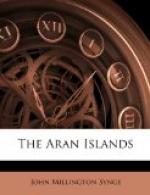I went out in the morning and walked up the cliffs as usual. Several men I fell in with shook their heads when I told them I was going away, and said they doubted if a curagh could cross the sound with the sea that was in it.
When I went back to the cottage I found the Curate had just come across from the south island, and had had a worse passage than any he had yet experienced.
The tide was to turn at two o’clock, and after that it was thought the sea would be calmer, as the wind and the waves would be running from the same point. We sat about in the kitchen all the morning, with men coming in every few minutes to give their opinion whether the passage should be attempted, and at what points the sea was likely to be at its worst.
At last it was decided we should go, and I started for the pier in a wild shower of rain with the wind howling in the walls. The schoolmaster and a priest who was to have gone with me came out as I was passing through the village and advised me not to make the passage; but my crew had gone on towards the sea, and I thought it better to go after them. The eldest son of the family was coming with me, and I considered that the old man, who knew the waves better than I did, would not send out his son if there was more than reasonable danger.
I found my crew waiting for me under a high wall below the village, and we went on together. The island had never seemed so desolate. Looking out over the black limestone through the driving rain to the gulf of struggling waves, an indescribable feeling of dejection came over me.
The old man gave me his view of the use of fear.
‘A man who is not afraid of the sea will soon be drowned,’ he said, ’for he will be going out on a day he shouldn’t. But we do be afraid of the sea, and we do only be drownded now and again.’
A little crowd of neighbours had collected lower down to see me off, and as we crossed the sandhills we had to shout to each other to be heard above the wind.
The crew carried down the curagh and then stood under the lee of the pier tying on their hats with strings and drawing on their oilskins.
They tested the braces of the oars, and the oarpins, and everything in the curagh with a care I had not seen them give to anything, then my bag was lifted in, and we were ready. Besides the four men of the crew a man was going with us who wanted a passage to this island. As he was scrambling into the bow, an old man stood forward from the crowd.
‘Don’t take that man with you,’ he said. ’Last week they were taking him to Clare and the whole lot of them were near drownded. Another day he went to Inisheer and they broke three ribs of the curagh, and they coming back. There is not the like of him for ill-luck in the three islands.’
‘The divil choke your old gob,’ said the man, ‘you will be talking.’
We set off. It was a four-oared curagh, and I was given the last seat so as to leave the stern for the man who was steering with an oar, worked at right angles to the others by an extra thole-pin in the stern gunnel.




